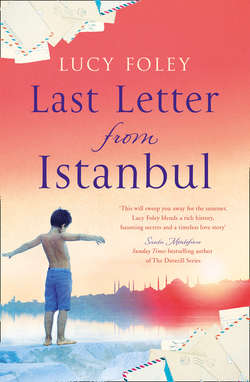Читать книгу Last Letter from Istanbul: Escape with this epic holiday read of secrets and forbidden love - Lucy Foley, Lucy Foley - Страница 16
Nur
ОглавлениеMorning. She feels renewed, the humiliations of the day before have lost their sting. The streets are still empty enough at this hour that they can stride through them quickly. She enjoys the pull and stretch of her muscles, the sound of her shoes ringing upon the cobblestones. The lesser note of the boy’s feet as he follows behind: two steps to her every one, and even then he struggles to keep up. He is still so small. But he is also, she knows, distracted by the scents that reach them from the bakeries and cafes they pass, his nose aloft in that feline way.
She is aware of the looks. In these narrow streets they pass near enough to see the glimmer of eyes through latticework screens and one woman pulls her shutters closed with an ostentatiously violent clatter. Odd, that it should be the women that seem most outraged by her bared face, by her presence in the street. The older ones are worst of all, understandably. She still feels the sting of their glances. At first they were almost enough to send her running back to the apartment for her veil. Now she steels herself against her own sense of shame. Because for all that the war took from her – and it was more than she ever thought she would have to give – there is this one thing that it gifted her. Her city. And she is not ready to give it up. The liberation of walking these streets that have always been her home and yet for so long have been beyond the limits of her knowledge.
She is not alone; much of a generation has joined her. Barriers shifted, dissolved entirely. Young women who had remained hidden indoors behind filigree screens ventured out into the streets. They appeared bare-faced. They took on the work of men – her grandmother is still outraged by the appearance of trouser-clad female street sweepers.
The boy is dawdling.
‘Come on, hurry up – we’re going to be late.’
She sees what has caught his attention; the same sight that she has been avoiding looking at. A group of French officers, in their blue uniforms, smoking their cigarettes and lounging against an old tree that has forced its way out of the cobblestones.
Children, she has noticed, are disloyally fascinated by the soldiers. Now, with building horror, she sees one of the men drop his cigarette, stub it out with a smartly polished boot, and come toward them.
‘Hello,’ he says, to the boy, in French. From the crowds passing them Nur feels a low hum of disapproval, levelled as much at her as at the man, as though they assume she must have done something to encourage him. And with it there is a certain sense of shame, as though she really has.
‘I have a little son like you, at home,’ he says now. ‘Do you know what he likes best?’ He does not wait to see if the boy has understood. ‘Caramels! Would you like one?’ He fishes a gold-wrapped sweet from his pocket.
‘No, thank you—’ But Nur is too late, the boy has already taken one.
‘I hope,’ the man’s eyes go to Nur’s uncovered face now, and remain there, ‘that you tell your mother how beautiful she is every day.’
She seizes the boy’s hand, and marches him away from the officers as fast as she can, without a backward glance. Ribald laughter follows them.
When they have put a little distance between themselves and the officers she puts out her hand. ‘Spit it out.’
‘But—’
‘Do it, please.’ She knows what a cruelty it is to take food from a child like him. But the French officers are still watching, and this is a point of principle.
With an expression of profoundest agony, the boy does as she says. She throws it down, and within seconds a street cat has emerged from somewhere to sniff at it.
Now she feels as though a layer of skin has been removed, not merely a thin gauze of material. The city now seems to thwart her at every turn: the cobblestones turn her ankles, the crowds press against her. She has become clumsy and conspicuous.
She understands that she is an object of curiosity for such men, who have come expecting veiled forms. She knows that they see her – her hair covered but her face exposed, wandering about the city as she chooses – and make suppositions. She tries to remind herself that it must not matter. To wait until a day when one might not be reminded with every step of one’s difference might mean waiting for a hundred years. More.
